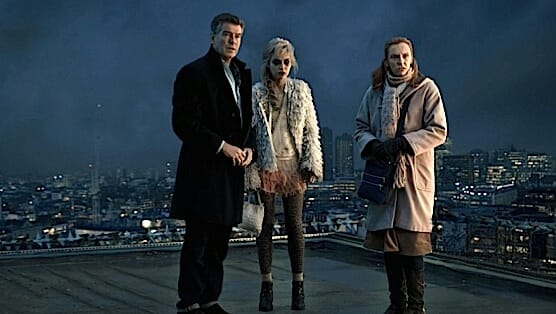A Long Way Down

Striking the right balance between suicide, depression and levity in a film is not an easy task: Too much mirth will inevitably lead to criticism of taking the subjects too lightly, while an overly bleak story may keep the cineplex crowds away. Such was the quandary for French filmmaker Pascal Chaumeil (director of A Perfect Plan and Heartbreaker) in A Long Way Down, his English-language debut. Chaumeil and screenwriter Jack Thorne had good source material to start with—Nick Hornby’s 2005 novel of the same name—but ultimately, the film struggles with a meandering story and superficial characters who do little to elicit compassion from the audience. Pushing the film over the edge into maudlin territory, however, is a saccharine ending that ultimately does a disservice to those truly struggling with depression.
The film opens on New Year’s Eve, when four strangers arrive separately on the roof of Topper’s Tower in London to commit suicide. Martin Sharp (Pierce Brosnan) is a disgraced television anchor who spent time in jail for “accidentally” sleeping with an underage girl. The incident cost him his job, wife and kids. Maureen (Toni Collette) is a single mother raising a nearly adult disabled son alone. Jess Crichton (Imogen Poots) is the daughter of a fairly high-ranking member of parliament (Sam Neill), and JJ (Aaron Paul) is an aimless, former musician who’s dying from a brain tumor.
Of course, since they all wanted (and expected) to be alone, waiting their turn(s) to jump is a bit anticlimactic. So at Jess’s insistence, the foursome make a pact to stave off their next attempt at least until the next major holiday, Valentine’s Day. (Contrary to popular belief, and Hornby’s original premise, suicide rates are not the highest during the winter holidays.) After such a brief encounter, why these four strangers would care about each other—and why the audience would, too—is an issue that plagues A Long Way Down.
For the next six weeks, the four are entwined in each other’s lives, as the British press finds out about the pact. Because of Martin’s notoriety and Jess’s prominent family, the media seize onto the Topper House Four’s stories, hoping to find more salacious material for their papers. Martin’s plan to harness the press in their favor backfires, leading to a disastrous and nasty TV interview for the foursome, conducted by Martin’s former co-host (Rosamund Pike). As he’s become a surrogate husband/father figure for the group, Martin arranges a vacation to the Canary Islands so they can stay out of the spotlight. The holiday ends ruinously as JJ is seduced by a reporter and then reveals the truth about his cancer.
Just when the Topper House Four may be no more, the ending all too neatly falls together as three members of the group reunite when Maureen’s son nearly dies from a heart problem. They look for their fourth throughout London as Valentine’s Day approaches—and we’ll give one guess as to where they find JJ.